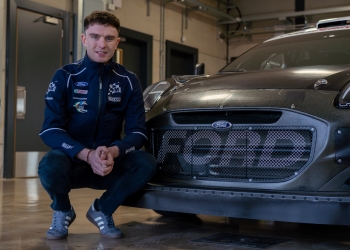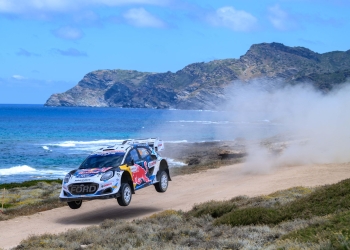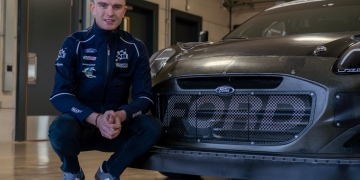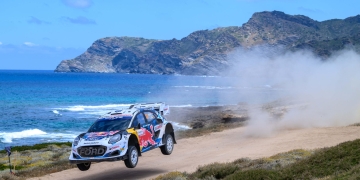Hybrid Rally1 cars will continue in the World Rally Championship until the end of 2026, the FIA has confirmed following Tuesday’s World Motor Sport Council.
It was widely expected that the FIA would make a U-turn on its February proposal to phase out Rally1 cars in their current guise, a decision ratified on Tuesday’s WMSC meeting
The proposal made earlier this year by the FIA’s working group centred on the removal of the Rally1 car’s hybrid power as early as next year as part of a plan to close the performance gap to Rally2 cars with a modified rear wing and a smaller air restrictor.
A proposal was added for manufacturers to produce an optional upgrade kit for Rally2 cars to increase their performance to allow some competitors to battle at the sharp end of rallies.
It was hoped this could increase entries and provide a smooth transition to all-new technical regulations in 2027.
Changes to Rally1 and Rally2 were strongly opposed by teams and manufacturers which resulted in a letter being penned to the FIA in April requesting for the current rules to remain in place.
The key concerns among the teams centred around the short timeframe to redesign, test and validate changes to cars for next season as well as substantial investments that have already been made in the current cars which was expected to be amortised across a five-year homologation cycle.
“Technical stability has been agreed between all stakeholders for the 2025 and 2026 FIA World Rally Championship seasons. The World Council has confirmed that, following extensive feedback and discussions, the WRC Technical Regulations for Rally1/2 cars will remain unchanged for the coming two years,” read a statement from the FIA.
“All stakeholders are working positively together on the direction of the regulations for 2027 and beyond, and there is a good consensus between the World Council members and the manufacturers on the key targets that are aimed primarily at increasing participation at the highest level as previously set out by the FIA.
“It is a strong expectation of the World Council that the current manufacturers will commit to the long-term future of the sport well in advance. These regulations will be presented for approval at the December meeting of the World Council, allowing more than two year’s lead time for manufacturers to adapt.
“Following a clear pledge to invest from the WRC Promoter, the FIA will strengthen its team across the Commercial and Communications Departments to extend their support for the Promoter and the key stakeholders around the Promotional Working Group.

“There will be a strong focus on managing the sporting regulations following the creation of the WRC Sporting Working Group, with a key emphasis on increasing the opportunities for media activation and reducing the costs for its competitors. The final versions of these Sporting Regulations are to be proposed in the October session of the WMSC.”
FIA president Mohammed Ben Sulayem added: “The WRC is hugely important to the FIA, it is the pinnacle of the rally discipline and I have had a lot of conversations with the manufacturers over the past weeks about its future direction.
“It is clear now that we all need to have technical stability for the next two years, but at the same time it is important for the FIA that, in providing this stability, we receive the same positive commitment from the manufacturers.”
The reaction to the decision has been positive from both the WRC Promoter and teams with the former describing the move as a “hugely important moment”.
“As the WRC Promoter this is a hugely important moment for us, as we can move forward with unity and consistency over the next two years from a technical perspective while we are investing heavily in new and exciting ways to grow the fanbase of the sport and deliver for our fans, said WRC Promoter Managing Director Jona Siebel.
It is a move that Toyota believes will save teams money and allow more time to focus on the 2027 regulations.
“It is very good news because if we think about this cycle the investment which have been made it makes sense to run through a cycle which is normally five years,” said Toyota team principal Jari-Matti Latvala. “If we had done changes now we would have needed to do a big investment so it is very clever choice to do and concentrate on stability and then do the new regulations for 2027.”

Hyundai has been most affected by the upheaval having to abandon plans to deliver a whole new car for 2025 under the current rules due to the uncertainty.
“We have worked very closely together with the FIA over the past months and while we all believe that stability of the technical regulations for 2025 and 2026 is the right thing, the very substantial steps made on the governance will provide for a more unified and positive approach towards the short term improvements and long term breakthroughs that we all agree the sport needs,” said team principal Cyril Abiteboul.
While pleased by a vote for stability in regulations, M-Sport Ford boss Malcolm Wilson says that is now time for proposals to improve the championship’s promotion to be enacted.
“This is a really positive step for us in the coming years,” said Wilson. “We have seen some good proposals on the promotion side, on the marketing side and the plans for event operations and now the work to make those things happen needs to start, and with a consistent proposition on the technical side, I think the scope is there to achieve our ambitious targets for the WRC.”
The FIA also confirmed plans to extend its exclusive Junior WRC car supply contract with M-Sport Poland for the Ford Fiesta Rally3 EVO for 2025.








